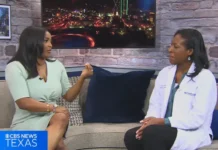It hit me after the birth of my second child: kidney failure. I knew I was at risk because I had lupus, a chronic autoimmune disease that can damage any part of the body, including the skin, joints and organs. People of color, including African Americans like myself, are at increased risk for both lupus and kidney problems.
One in seven American adults—more than 30 million people—have chronic kidney disease; most don’t know it. It is progressive and irreversible, although that progression can be slowed through lifestyle changes and careful attention to diet and medication.
For me, it began when I was 30 years old, and it took doctors a while to assess what the problem was. My lungs kept filling with fluid, and they couldn’t figure out why. I had what is known as pulmonary edema, and I had to be hospitalized every two weeks. It was very scary, especially because I had two young children.
Then they figured out my kidneys weren’t working. The lupus had attacked them. I went on dialysis at Northwest Kidney Centers for several years, which went well, and then I got a kidney transplant in 2004.
You have to be pretty healthy to get a kidney transplant. From your teeth to your toenails, you have to be checked out. Then you go on a list, where you wait for a kidney to become available to you. Back when I got my transplant, I had to carry a pager. When you got the page that a kidney was available, you had to rush to the hospital. I got mine from a deceased donor.
I don’t know a lot about the person, though they gave me some details. I had the sense it was a relatively young person, someone in their late 20s or early 30s. I was allowed to write a letter to the person who agreed to give the donor’s kidney away. I told them a little bit about myself, that I had two young children and was pursuing a graduate degree. I wrote that it was wonderful to have some certainty I’d be around to raise my children. I felt like a big weight had been lifted from me. I felt so fortunate and so lucky and really hopeful.
I was charged with energy after the transplant. I was back at work in five days. There was life to be lived!
I have to say I never have felt bad at any time during the course of my kidney disease, even on dialysis. But with the transplant, my mobility was greater, and I could go places more easily.
The transplanted kidney did run its course. I had it for about seven years when the new kidney stopped working. I am now back on dialysis, but I give myself the treatments at home. I’ve been doing it for about two years. I got training in the do-it-yourself method at Northwest Kidney Centers, and I go there once a month for a checkup.
I am part of the 17 percent of Northwest Kidney Centers’ patients who give themselves dialysis at home. Across the country, only 8.5 percent of patients do it themselves rather than visit a dialysis center three times a week.
I think home dialysis is a great way to go, because it’s convenient and excellent for your health. Home dialysis patients have a 61 percent better survival rate than patients who dialyze in a center. When I feel psychologically ready, I’ll go back and do another transplant.
I truly feel great: I’m now 47, and I love to work out, especially kickboxing and circuit and weight training, plus time on the treadmill. I also love to hike and camp. Our family goes camping about five times a year. My older son, Miles, who’s 19, is going to college in New York state, studying computer science, while my younger son, Julian, is 17 and a senior at Lindbergh High School in Renton.
I’m currently a volunteer with CASA, Court Appointed Special Advocates. We serve as the voice of children in court when their parents are involved in contested paternity, divorce and third-party custody cases. Often, the cases involve mental health issues in the family. I love making connections between children, parents and the system.
Since March is kidney health month, I do want people to be aware of the issue and their health in general. I would tell people to pay attention to their health and not to take it for granted. African Americans especially need to listen to their bodies and not let things go if problems seem to be cropping up. They can’t say “I’ll check it out later,” or excuse things away. Many times, there are medical problems that could be successfully handled if you just take care of it. African Americans don’t seek medical attention like we should. So listen to your body. Good health has got to start with individuals – people being advocates for themselves.
For further information on kidney disease, visit www.nwkidney.org, the Northwest Kidney Centers website.
















